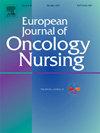Planned motherhood distress in women of reproductive age with breast cancer–impacts of partner relationship, fear of cancer recurrence, decision conflict, and fertility concerns
IF 2.7
3区 医学
Q1 NURSING
引用次数: 0
Abstract
Purpose
This study examined the effects of partner relationships, fear of breast cancer recurrence (FBCR), decision conflict (DC), and fertility concerns (FC) on distress in planned motherhood (DPM) among women of reproductive age with breast cancer (WRABC).
Methods
A cross-sectional design was employed to recruit 100 WRABC aged 20–49 years, menstruating, newly diagnosed, and undergoing gonadotoxic therapies, from a medical center in southern Taiwan. Participants with multiple malignancies, chronic diseases, mental disorders, or infertility were excluded. All participants completed six questionnaires assessing demographics, personality, FBCR, DC, FC, and DPM. Structural equation modeling (SEM) was conducted.
Results
The SEM showed an acceptable fit (root mean square error of approximation = 0.07, comparative fit index = 0.99) with the following significant associations: Neuroticism with FBCR (β = 0.41, P < 0.01); partner relationship with FBCR (β = −0.20, P < 0.05); FBCR with DC (β = 0.29, P < 0.05), which in turn was significantly associated with fertility concerns (β = 0.22, P < 0.05); FC with DPM (β = 0.71, P < 0.01). Moreover, FBCR, DC, and FC significantly mediated the relationship between partner relationship (coefficient = −0.003, 95% CI = −0.015, −0.0004) and personality (coefficient = 0.009, 95% CI = 0.002, 0.031) on DPM. Despite both partner relationship and personality influencing DPM through these mediators, partner relationship had a negative correlation with FBCR.
Conclusions
Planned motherhood distress in WRABC is driven by FBCR, DC, and FC, with personality and partner relationships influencing the process. Individualized care strategies addressing these factors are essential for supporting decision-making and improving quality of life.
伴侣关系、对癌症复发的恐惧、决策冲突和生育问题对育龄乳腺癌妇女计划孕产痛苦的影响
目的探讨伴侣关系、乳腺癌复发恐惧(FBCR)、决策冲突(DC)和生育担忧(FC)对育龄乳腺癌妇女计划孕产痛苦(DPM)的影响。方法采用横断面设计,从台湾南部某医疗中心招募100名年龄20 ~ 49岁、月经来潮、新诊断、正在接受性腺毒素治疗的WRABC患者。患有多种恶性肿瘤、慢性疾病、精神障碍或不孕症的参与者被排除在外。所有参与者都完成了六份调查问卷,评估人口统计、个性、FBCR、DC、FC和DPM。进行了结构方程建模(SEM)。结果扫描电镜显示可接受的拟合(近似均方根误差= 0.07,比较拟合指数= 0.99),具有以下显著相关性:神经质与FBCR (β = 0.41, P <;0.01);与FBCR的伙伴关系(β = - 0.20, P <;0.05);FBCR与DC (β = 0.29, P <;0.05),这反过来又与生育问题显著相关(β = 0.22, P <;0.05);FC与DPM (β = 0.71, P <;0.01)。此外,FBCR、DC和FC显著中介了伴侣关系(系数= - 0.003,95% CI = - 0.015, - 0.0004)和个性(系数= 0.009,95% CI = 0.002, 0.031)对DPM的影响。尽管伴侣关系和人格都通过这些中介影响DPM,但伴侣关系与FBCR呈负相关。结论WRABC的计划生育窘迫受FBCR、DC和FC驱动,人格和伴侣关系影响。针对这些因素的个性化护理策略对于支持决策和改善生活质量至关重要。
本文章由计算机程序翻译,如有差异,请以英文原文为准。
求助全文
约1分钟内获得全文
求助全文
来源期刊
CiteScore
4.40
自引率
3.60%
发文量
109
审稿时长
57 days
期刊介绍:
The European Journal of Oncology Nursing is an international journal which publishes research of direct relevance to patient care, nurse education, management and policy development. EJON is proud to be the official journal of the European Oncology Nursing Society.
The journal publishes the following types of papers:
• Original research articles
• Review articles

 求助内容:
求助内容: 应助结果提醒方式:
应助结果提醒方式:


